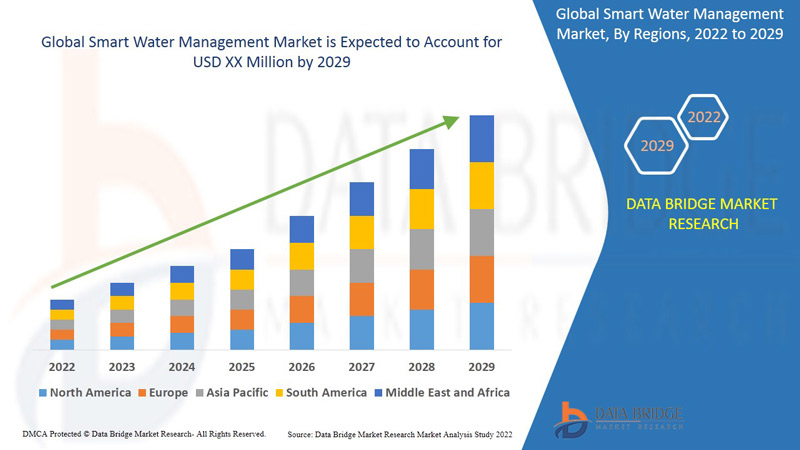Smart Water Management Market Opportunities | Future Growth, Demand, and Challenges 2025 - 2032
Smart water management market is expected to gain market growth in the forecast period of 2022 to 2029. Data Bridge Market Research analyses the market to grow at a CAGR of 11.8% in the above-mentioned forecast period.
Introduction
Water is one of the most critical resources for human survival, industrial processes, and agriculture. With growing population, urbanization, industrialization, and climate change, water scarcity and quality have become significant global concerns. Smart water management systems, powered by digital technologies, sensors, and data analytics, are emerging as key solutions to address these challenges. These systems optimize water usage, improve distribution efficiency, monitor quality, detect leaks, and support sustainable water practices.
The smart water management market has gained traction globally due to increasing awareness of water conservation, regulatory mandates for efficient water use, and the adoption of advanced technologies across industries. From municipal water utilities to agriculture and industrial applications, smart water solutions are playing a critical role in reducing wastage, ensuring compliance, and promoting sustainability.
This article provides a detailed analysis of the smart water management market, including drivers, challenges, opportunities, regional insights, technological trends, and future outlook.
Market Overview
Smart water management encompasses the integration of advanced information and communication technologies with water infrastructure to monitor, manage, and optimize water resources. Core components include smart meters, sensors, networked monitoring systems, advanced analytics platforms, and automated control mechanisms. These solutions are deployed across various segments such as municipal water supply, industrial water management, and irrigation systems in agriculture.
The market has evolved rapidly due to increasing concerns about water scarcity, rising operational costs of water utilities, and the need to comply with environmental regulations. Smart water management systems offer utilities the ability to monitor consumption patterns, detect leakages, and prevent water losses in real time. They also facilitate data-driven decision-making, improving efficiency and reducing operational expenditures.
Adoption is not limited to utilities; industrial players and agricultural enterprises are increasingly integrating smart water solutions to optimize usage, improve productivity, and maintain compliance with environmental standards. Advanced systems are capable of predictive maintenance, remote monitoring, and integration with broader smart city initiatives, further driving market demand.
Market Drivers
Several factors are propelling the growth of the smart water management market:
The first key driver is the global water scarcity challenge. According to industry reports, freshwater resources are under severe pressure due to population growth, urbanization, and changing climatic patterns. Smart water management solutions enable better utilization of available water resources, reducing wastage and ensuring sustainable consumption.
Second, government initiatives and regulatory policies supporting water conservation are driving adoption. Many countries have implemented mandates requiring utilities and industries to reduce water losses, monitor consumption, and comply with water quality standards. Smart water technologies facilitate compliance with these regulations while enhancing operational efficiency.
Technological advancements are another important driver. The integration of Internet of Things (IoT) sensors, cloud computing, artificial intelligence (AI), and machine learning in water management systems enables real-time monitoring, predictive analytics, and automated decision-making. These innovations improve system efficiency, reduce downtime, and help manage water resources effectively.
Rising awareness about environmental sustainability and corporate social responsibility is also fueling demand. Organizations are increasingly adopting smart water solutions to optimize resource use, minimize environmental impact, and align with sustainable development goals.
Market Challenges
Despite its growth potential, the smart water management market faces several challenges.
High initial investment costs are a significant barrier, particularly for smaller utilities and organizations in developing regions. The deployment of smart sensors, communication networks, and advanced analytics platforms requires substantial capital expenditure.
Integration with existing water infrastructure can be complex. Many water utilities operate on legacy systems, making the retrofitting of smart technologies challenging. Interoperability and standardization of devices remain technical hurdles that need to be addressed for widespread adoption.
Data security and privacy concerns also pose challenges. As smart water systems collect and transmit real-time data, they become vulnerable to cyberattacks. Ensuring the security of critical infrastructure and sensitive information is essential.
Additionally, lack of skilled personnel to manage, analyze, and maintain smart water systems in some regions may slow market adoption. Training programs and capacity-building initiatives are necessary to address this gap.
Opportunities
The smart water management market offers several growth opportunities.
Emerging technologies, such as AI-driven predictive analytics and blockchain-based water management systems, have the potential to enhance operational efficiency and transparency. Predictive maintenance and anomaly detection can minimize water losses and optimize system performance.
Integration with smart city projects provides substantial opportunities. As urban centers adopt digital solutions for traffic, energy, and waste management, smart water systems can be integrated into broader city infrastructure, enabling more efficient and sustainable urban water management.
The industrial sector presents opportunities for tailored solutions. Industries such as pharmaceuticals, food and beverages, and textiles have high water consumption and face strict regulatory requirements. Smart water systems can help monitor usage, improve efficiency, and maintain compliance.
Growing awareness in agriculture about precision irrigation and water-efficient farming methods is also creating market potential. Smart irrigation systems equipped with sensors and automated controls help optimize water usage, increase crop yields, and conserve resources.
Regional Insights
North America is a leading market for smart water management, driven by advanced infrastructure, regulatory frameworks, and widespread adoption of IoT technologies. The United States, in particular, has seen strong adoption in municipal water utilities, industrial sectors, and smart city initiatives.
Europe follows closely, with countries like Germany, France, and the United Kingdom investing heavily in smart water infrastructure. Stringent environmental regulations, public awareness campaigns, and sustainability initiatives are key drivers in this region.
Asia-Pacific is emerging as a high-growth market. Rapid urbanization, industrial expansion, and increasing demand for water-efficient solutions in countries such as China, India, and Japan are boosting market adoption. Government support and rising awareness of water scarcity challenges are further contributing to growth.
Latin America, the Middle East, and Africa represent developing markets with growing opportunities. Investments in water infrastructure, increasing awareness of water management, and international funding programs are expected to drive adoption in these regions.
Technological Trends
The smart water management market is witnessing continuous technological innovation.
IoT-enabled sensors are the backbone of modern systems, providing real-time data on water flow, pressure, and quality. These sensors enable proactive maintenance and timely response to leakages or anomalies.
Cloud-based platforms allow centralized monitoring and control of water systems. They facilitate data collection, remote management, and predictive analytics, helping utilities and industries make informed decisions.
Artificial intelligence and machine learning are increasingly used to analyze consumption patterns, forecast demand, and optimize system performance. These tools enhance efficiency, reduce losses, and support sustainable water use.
Blockchain technology is also emerging as a solution to improve transparency and traceability in water management. By securely recording water usage and transaction data, blockchain enables better governance, accountability, and resource allocation.
Future Outlook
The future of the smart water management market is promising. Increasing population, urbanization, and climate change are expected to drive the need for efficient water management systems globally. Technological advancements, regulatory support, and growing awareness of sustainability will further accelerate market growth.
The integration of smart water systems with other urban infrastructure, such as energy grids and waste management, will create new opportunities for holistic smart city solutions. Additionally, industries and agriculture sectors are likely to adopt advanced water management solutions to optimize efficiency, reduce costs, and comply with environmental standards.
As technologies evolve and costs decrease, smaller municipalities and enterprises will also be able to implement smart water management systems, broadening the market potential. Strategic partnerships, research collaborations, and innovation in sensor technology, AI analytics, and cloud integration will define the competitive landscape in the coming years.
Conclusion
The smart water management market is a critical component of global efforts to optimize water usage, improve sustainability, and address growing water scarcity challenges. By leveraging IoT, AI, and data analytics, smart water systems provide utilities, industries, and agricultural operations with the tools to monitor, control, and optimize water resources effectively.
While high initial costs, integration challenges, and cybersecurity risks remain concerns, technological innovations and regulatory support are expected to drive widespread adoption. North America and Europe currently lead the market, while Asia-Pacific is emerging as a high-growth region due to urbanization and industrial demand.
The future of smart water management is closely tied to sustainable development goals, smart city initiatives, and precision agriculture practices. By enabling efficient and intelligent water use, the market is poised to play a crucial role in ensuring water security and sustainability globally.
FAQs
What are the primary technologies used in smart water management systems?
How are smart water management solutions applied in agriculture?
Which regions are expected to drive the highest growth in the market?
What challenges do utilities face when implementing smart water management systems?
How are AI and IoT transforming the smart water management landscape?
Equip yourself with actionable insights and trends from our complete Smart Water Management Market analysis. Download now:https://www.databridgemarketresearch.com/reports/global-smart-water-management-market
Browse More Reports:
Global Pharmacy Retail Market
Global Polyethylene Packaging Market
Global Porridge Market
Global Potassium Sulfate Fertilizers Market
Global Preventive Health Screening Services Market
Global Protein Powder Market
Global Regenerative Medicine Market
Global Robotic Lawn Mower Market
Global Sewing Machines Market
Global Smart Building Market
Global Surgical Staplers Market
Global Terrestrial Laser Scanning Market
Global Thermal Interface Material Market
Global Thermoelectric Materials Market
Global Tobacco Products Market
About Data Bridge Market Research:
An absolute way to forecast what the future holds is to comprehend the trend today!
Data Bridge Market Research set forth itself as an unconventional and neoteric market research and consulting firm with an unparalleled level of resilience and integrated approaches. We are determined to unearth the best market opportunities and foster efficient information for your business to thrive in the market. Data Bridge endeavors to provide appropriate solutions to the complex business challenges and initiates an effortless decision-making process. Data Bridge is an aftermath of sheer wisdom and experience which was formulated and framed in the year 2015 in Pune.
Contact Us:
Data Bridge Market Research
US: +1 614 591 3140
UK: +44 845 154 9652
APAC : +653 1251 975
Email:- corporatesales@databridgemarketresearch.com
- Art
- Causes
- Crafts
- Dance
- Drinks
- Film
- Fitness
- Food
- Jogos
- Gardening
- Health
- Início
- Literature
- Music
- Networking
- Outro
- Party
- Religion
- Shopping
- Sports
- Theater
- Wellness


